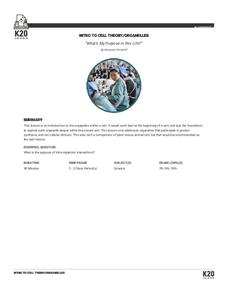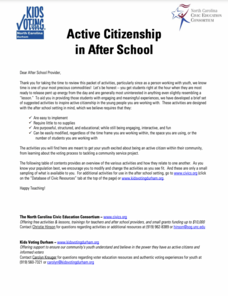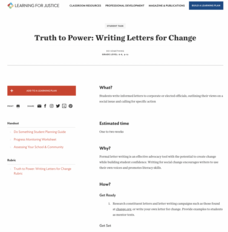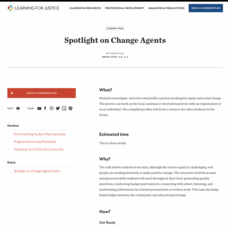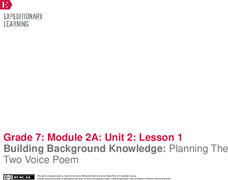Curated OER
Mirror Image
Why does practice make perfect? Give your class insight into procedural memory, where we learn to do new things — then continue to improve through repetition. By attempting to draw shapes while looking in a mirror, learners observe their...
K20 LEARN
The Parched Plains: Weather And Climate
How do meteorologists differentiate between droughts and dry spells? Introduce the concepts of weather forecasting and prediction with an insightful research-based lesson from the K20 series. Partners synthesize individual research from...
K20 LEARN
Rules Of The Mogwai: Lab Safety And Chemical Properties
When you don't follow the rules, bad things can happen! Kick off your next lab safety lesson using a resource from the K20 Center. Pupils partner up to decipher MSDS for common lab chemicals, brainstorm common safety rules and their...
K20 LEARN
Water We Going To Do? Floodplains And Watershed Management
How has human activity affected Earth's watersheds? An action-packed lesson plan, part of the K20 Center, examines water's ability to go with the flow regardless of what is in its path. Scholars build model watersheds, examine time-lapse...
K20 LEARN
What's My Purpose In This Life? Intro To Cell Theory/Organelles
Why are we here? Well, if you happen to be a Golgi body, the answer is simple! Young biologists embark upon a journey through the tiny world of cellular organelles with an engaging lesson from the K20 Center. The activities open with an...
Carolina K-12
Political Parties and Conventions
The two major parties polarize many in America today, but it doesn't have to be that way in the classroom! Teach learners about political party platforms and modern campaigns with a mock political convention. After watching a PowerPoint...
Carolina K-12
Active Citizenship in After School
Active citizenship is the bedrock of any great democracy. Continue the trend by teaching the next generation about voting rights and the functions of elections in society. The variety of activities in the resource includes a human...
Academy of American Poets
Teaching the Vietnam War with Poetry and Archives
The language of and the perspective of photographs, poems, and official reports differ. After a close reading of two photographs, two poems, and a military report about the Vietnam War, individuals adopt someone's voice or something from...
Museum of the American Revolution
Hamilton Was Here: Rising Up in Revolutionary Philadelphia
Hamilton may be a hit Broadway show, but there is so much more to learn. An eight-unit resource guides young historians through the life of Alexander Hamilton and the Revolutionary War. The lessons include hands-on-activities, writing,...
National Park Service
Discover the Mary Ann Shadd Cary House
Mary Ann Shadd Cary was an extraordinary woman, no matter the time period. Academics research the life and achievements of Mrs. Cary, who was born a free African American in 1823. The lesson uses primary sources, worksheets, written...
EngageNY
Final Performance Task: Sharing Visual Representations of Position Papers
Let's take a stroll! Scholars go on a gallery walk to view the visual representations for the performance task created by the class. They then view a variety of books about environment and sustainability and conduct book talks on the...
Teaching Tolerance
Voting in Your Town
A socially important resource focuses on voter turnout and roadblocks to voting. Scholars review resources on voting stats, watch a documentary, and participate in group discussion regarding voting in their local communities. Academics...
Teaching Tolerance
Truth to Power: Writing Letters for Change
Can letter writing really create social change? Pupils create and mail formal letters addressing a specific organization to promote social change they wish to see. Class members reflect on the process and responses they received in small...
Teaching Tolerance
Why Do We (Still) Celebrate Columbus Day?
What are we really celebrating on Columbus Day? The resource explores the narrative behind Columbus Day and ways for people to change the perception. Scholars also review vocabulary terms associated with the topic and how attitudes have...
Teaching Tolerance
Spotlight on Change Agents
A thought-provoking resource guides learners as they interview agents of social change and share their findings. Scholars select an individual, create questions, conduct the interview, and create a profile of the person they selected....
EngageNY
Research: Paraphrasing Relevant Information
Readers take a look at the source Ethical Style: How Is My T-Shirt Made? and discuss how to say the information in the article without plagiarism. Learners make note of and underline sentences that may present a problem in paraphrasing....
EngageNY
Researching: Asking the Right Questions
Learners look over the iCare about the iPhone performance task and discuss how it relates to working conditions. They then review the research process and place focus on the step of asking questions. Finally, scholars ask questions to...
Judicial Branch of California
Faces of Citizenship: Jury Duty
An interesting middle school instructional activity focuses on the rights and responsibilities of citizens. Academics choose a civic project to complete, such as an oral history or photo essay. They then conduct interviews with members...
EngageNY
Deepening Your Research
Give credit where credit is deserved. Scholars discuss what makes a credible source as they take a look at "An Apparel Factory Defies Sweatshop Label, but Can It Thrive?" Learners read the article to look for answers to the research...
EngageNY
Building Background Knowledge: Planning The Two Voice Poem
Scholars build background knowledge to understand the life and work of the union leader and labor organizer César Chávez. As they read teacher-selected resources, they complete a Building Background Knowledge worksheet and engage in...
EngageNY
Introducing Working Conditions in the Mills
Scholars discover how working in a textile mill in the nineteenth century affected the title character from Katherine Paterson's novel, Lyddie. Partners analyze quotes from the novel and then add evidence and questions about working...
EngageNY
Analyzing Character: Who is Lyddie?
Character analysis can help readers feel more connected to a literary text. Scholars explore the topic by writing an acrostic poem about the main character from Katherine Paterson's novel, Lyddie. Then, pupils watch a short video to help...
EngageNY
Launching Lyddie
Pupils engage in a close reading of chapter one of Katherine Paterson's novel, Lyddie. After answering text-dependent questions based on their reading, they complete reader's notes about how the setting, characters, and plot interact.
EngageNY
Considering Author’s Purpose: Comparing Fictional and Historical Experiences of the Second Sudanese Civil War (Chapters 14 and 15, Plus Rereading “Time Trip,” Continued)
Is that a true story? Readers work to gather evidence for comparing the historical and fictional text Time Trip: Sudan’s Civil War and A Long Walk to Water. Scholars identify the use of real people and experiences versus the use of...






